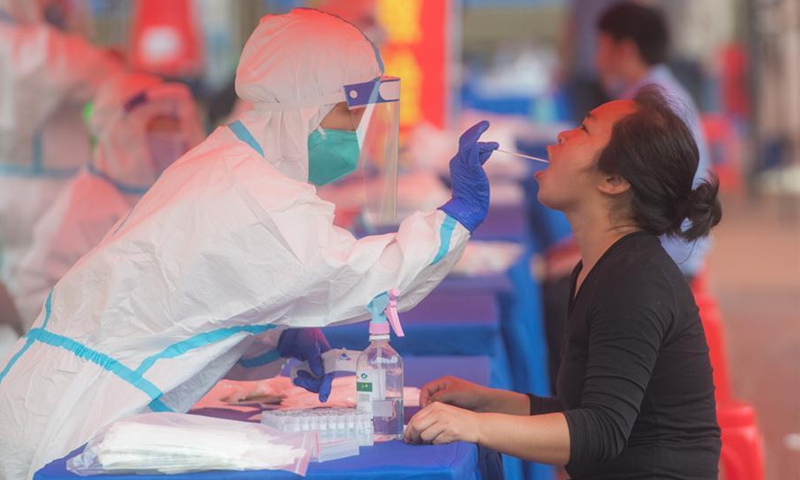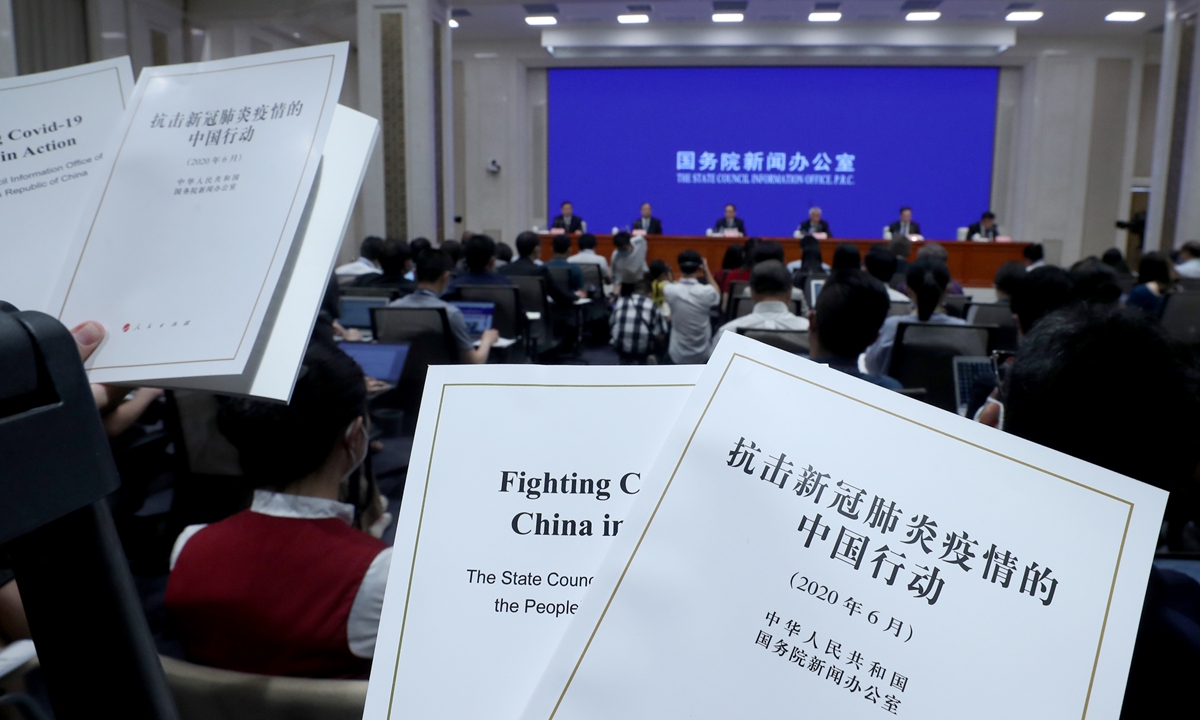That the World Health Organization (WHO) altered the timeline of the COVID-19 outbreak does not change the fact that China reported a potential outbreak to the organization at the earliest possible time, Chinese experts said, as they demanded foreign media outlets stop generating misinterpretations and twisting facts about the updated timeline.

A resident takes the nucleic acid test at a testing post set up at a primary school in Dongxihu District in Wuhan, central China's Hubei Province, May 15, 2020. (Photo: Xinhua)
In the updated version of the WHO timeline on June 29 over the COVID-19 pandemic, the WHO wrote that it learnt about a potential new coronavirus in the first place when China representatives picked up a media statement by the Wuhan Municipal Health Commission from their website on December 31, 2019.
WHO's previous timeline stated that "Wuhan Municipal Health Commission reported a cluster of cases of pneumonia in Wuhan on December 31."
The WHO updated the pandemic timeline at a time when certain countries in the world are trying to scapegoat China, where the novel coronavirus was first reported, for their failure in coping with the pandemic, which has so far infected over 10 million people worldwide.
Zeng Guang, chief epidemiologist of the Chinese Center for Disease Control and Prevention, told the Global Times on Sunday that the alteration of the timeline does not change the fact that China reported the potential epidemic in a responsible manner and at its quickest possible speed to the WHO.
When the novel coronavirus was first identified in Wuhan, it was only known to Chinese authorities as "viral pneumonia of unknown cause" and China knew nothing about its viral pathogen, whether it possessed human-to-human transmission, or how infectious it could be. But despite that, China still reported the virus to the WHO with its fastest speed, Zeng said.
After Wuhan Health Commission reported it had found a pneumonia of unknown cause on December 30, 2019 to its administrative medical institutes, China's National Health Commission (NHC) started researching on it immediately. Then at midnight on December 31, the NHC dispatched an expert team to Wuhan to investigate.
"Chinese health authorities and experts worked against time to investigate and explore what was causing the new pneumonia found in Wuhan, and within such a short time, when the novel coronavirus was still not fully understood by Chinese health authorities and experts, China reported the virus to the WHO in a responsible manner," Zeng said.
For a major pandemic like COVID-19, China did its best to report the potential danger of the public health emergency to the world, Zeng said, noting that COVID-19 is different from the H1N1 influenza virus in 2009, as the former is completely new to all humankind and shows different infectivity as it frequently mutates.
The WHO claimed in its revised timeline that it requested relevant information from Chinese authorities on January 1 and the WHO Representative in China also wrote to the NHC on January 2 about the cluster of cases. China provided information to the WHO on January 3 on cluster of cases of a "viral pneumonia of unknown cause" identified in Wuhan, the WHO updated timeline said.
WHO emergencies director Michael Ryan told a news conference Friday that countries have 24-48 hours to officially verify an event and provide the agency with additional information about the nature or cause of an event.
Ryan added that the Chinese authorities immediately contacted the WHO as soon as the agency asked to verify the report, AFP reported.
China did not have any motivation to hide the epidemic to the world. Now everything is online and crystal clear to all, so there is no use in hiding anything, Zeng said.
Last week, the WHO said it plans to send a team to China to prepare to identify the source of the novel coronavirus.
The Chinese Foreign Ministry welcomed the team, and Chinese experts said it demonstrates the open, transparent and cooperative attitude of Chinese government in tracing the source of the virus.

China's State Council Information Office releases a white paper on Sunday, outlining China's detailed steps and measures in fighting the COVID-19 epidemic. (Photo: cnsphoto)
Wrong interpretation
The change in the actual words used on the WHO timeline is different from what the WHO had said but this change has been wrongly interpreted by some forces and foreign media. Some said the updated WHO timeline "overturned" the previous fact that the WHO's previous timeline stated that "Wuhan Municipal Health Commission reported a cluster of cases of pneumonia in Wuhan on December 31."
A VOA report claimed that China failed to report information to the WHO in a timely manner and accused China of breaking clauses of the International Health Regulations (IHR) which require states to report major public health incidents to the organization.
Zeng slammed the accusation, saying "China did not delay its report on the epidemic to the WHO or broke clauses of the IHR, which requires reporting major public health incidents, incidents of an equivalent scale such as SARS and the Fukushima nuclear leak."
Public health incidents happen frequently in any country around the world. It is not possible to inform the WHO every time there is an incident, and not before causes are verified or risks are assessed, Wang Guangfa, a respiratory expert at Peking University First Hospital who went to Wuhan to investigate in early January, told the Global Times on Tuesday.
NHC spokesperson Hu Qiangqiang on Friday, in response to a question at a media briefing, refuted reports of some US media outlets which claimed that WHO updating the timeline about the COVID-19 outbreak on June 30 indicates that WHO has admitted China never reported the outbreak to the WHO. To that, Hu stressed that the media reports were inconsistent with the facts.
After the outbreak, China has held an open, transparent and highly responsible attitude toward the global health security, and promptly notified the WHO and other countries in the first place, shared the full genetic sequence of the novel coronavirus and informs the WHO about the situation on a regular basis, Hu said.
The misinterpretation is once again showing that some forces and media are taking a colored spectacle to view China. It is defaming China for political purposes, Wang said, noting that when certain other countries failed to contain the deadly virus, they blamed China for delaying its disclosure about the virus.
Zeng noted that the WHO's low-profile alteration generates confusion to the world, and suggested the WHO give a necessary explanation.
The US government accuses China of trying to cover up the novel coronavirus outbreak and also blames the WHO for failing to hold China to account and threatened to withdraw funding from the international organization, media reports said.
The WHO and the WHO China office did not reply to an interview request from the Global Times as of press time.
Chinese experts called on the international community stop playing blame games when the source of SARS-CoV-2, the virus which causes COVID-19, is still unknown to all and continuing to threaten humankind. China is the first country to report the cases of COVID-19, but it does not mean the virus originated in China, Chinese experts said.
More evidences have shown that the virus may have existed in other countries before the first case was reported by China. Spain detected the presence of the novel coronavirus in its city sewage in March last year, and Italy made similar findings, media reports said.


